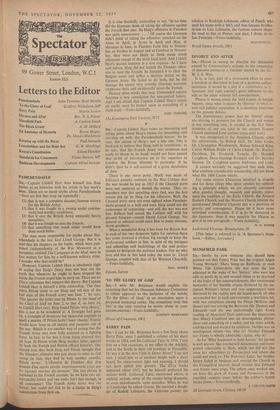SIR,—Captain Liddell Hart raises an interesting and telling point about
Haig's excuse for launching, and carrying on with, the Passchendaele horror. As he says, this excuse of Haig's was a late one. One is hard put to believe that Haig, told in 'confidence,' as he says, that the French Army was mutinous and ready to throw in its hand, would not have passed that tit-bit of information on to his superiors in London, the Prime Minister in particular. If he didn't, then he is self-accused of a grave dereliction of duty.
There is one more point. Much was made of Jellicoe's panicky outburst to the War Cabinet that the war would be lost in 1917 if the Channel ports were not captured or denied the enemy. That, re- searchers into this appalling story find, was the first reason put up by Haig for his offensive. Well, the Channel ports were not even sighted when Passchen- daele ground to a halt and even Haig could see the uselessness of continuing—and still the war was not lost. Jellicoe had scared the Cabinet stiff with his gloomy forecast—except David Lloyd George. No general or admiral could scare him to panic stations, thank goodness.
What a wonderful thing it has been for Britain that in each of her two desperate fights for survival there has come forward a civilian big enough to keep the professional soldiers in line, in spite of the intrigues and schemings and backbitings of the said profes- sionals to denigrate the political leaders. For we who love and live in this land today the toast is: Lloyd George, coupled with that of Sir Winston Churchill. —Yours faithfully,










































































 Previous page
Previous page